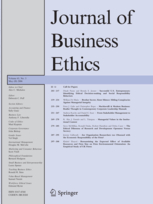Business ethics is a form of applied ethics or professional ethics, that examines ethical principles and moral or ethical problems that can arise in a business environment. It applies to all aspects of business conduct and is relevant to the conduct of individuals and entire organizations. These ethics originate from individuals, organizational statements or the legal system. These norms, values, ethical, and unethical practices are the principles that guide a business.

Research is "creative and systematic work undertaken to increase the stock of knowledge". It involves the collection, organization, and analysis of evidence to increase understanding of a topic, characterized by a particular attentiveness to controlling sources of bias and error. These activities are characterized by accounting and controlling for biases. A research project may be an expansion of past work in the field. To test the validity of instruments, procedures, or experiments, research may replicate elements of prior projects or the project as a whole.
This index of ethics articles puts articles relevant to well-known ethical debates and decisions in one place - including practical problems long known in philosophy, and the more abstract subjects in law, politics, and some professions and sciences. It lists also those core concepts essential to understanding ethics as applied in various religions, some movements derived from religions, and religions discussed as if they were a theory of ethics making no special claim to divine status.

Corporate social responsibility (CSR) or corporate social impact is a form of international private business self-regulation which aims to contribute to societal goals of a philanthropic, activist, or charitable nature by engaging in, with, or supporting professional service volunteering through pro bono programs, community development, administering monetary grants to non-profit organizations for the public benefit, or to conduct ethically oriented business and investment practices. While once it was possible to describe CSR as an internal organizational policy or a corporate ethic strategy similar to what is now known today as Environmental, Social, Governance (ESG); that time has passed as various companies have pledged to go beyond that or have been mandated or incentivized by governments to have a better impact on the surrounding community. In addition, national and international standards, laws, and business models have been developed to facilitate and incentivize this phenomenon. Various organizations have used their authority to push it beyond individual or industry-wide initiatives. In contrast, it has been considered a form of corporate self-regulation for some time, over the last decade or so it has moved considerably from voluntary decisions at the level of individual organizations to mandatory schemes at regional, national, and international levels. Moreover, scholars and firms are using the term "creating shared value", an extension of corporate social responsibility, to explain ways of doing business in a socially responsible way while making profits.
Norman E. Bowie is professor emeritus at the University of Minnesota. Until his retirement in 2009 he was Elmer L Andersen Chair of Corporate Responsibility and served in the departments of strategic management and of philosophy. He is an important voice in ongoing debates over business ethics, in which his own voice has been in favor of the Kantian view of ethics as a Kingdom of Ends.
Qualitative properties are properties that are observed and can generally not be measured with a numerical result. They are contrasted to quantitative properties which have numerical characteristics.

Social entrepreneurship is an approach by individuals, groups, start-up companies or entrepreneurs, in which they develop, fund and implement solutions to social, cultural, or environmental issues. This concept may be applied to a wide range of organizations, which vary in size, aims, and beliefs. For-profit entrepreneurs typically measure performance using business metrics like profit, revenues and increases in stock prices. Social entrepreneurs, however, are either non-profits, or they blend for-profit goals with generating a positive "return to society". Therefore, they use different metrics. Social entrepreneurship typically attempts to further broad social, cultural and environmental goals often associated with the voluntary sector in areas such as poverty alleviation, health care and community development.

The Committee on Publication Ethics (COPE) is a nonprofit organization whose stated mission is to define best practice in the ethics of scholarly publishing and to assist editors and publishers to achieve this.

Business economics is a field in applied economics which uses economic theory and quantitative methods to analyze business enterprises and the factors contributing to the diversity of organizational structures and the relationships of firms with labour, capital and product markets. A professional focus of the journal Business Economics has been expressed as providing "practical information for people who apply economics in their jobs."
Organizational ethics is the ethics of an organization, and it is how an organization responds to an internal or external stimulus. Organizational ethics is interdependent with the organizational culture. Although it is to both organizational behavior and industrial and organizational psychology as well as business ethics on the micro and macro levels, organizational ethics is neither organizational behavior nor industrial and organizational psychology, nor is it solely business ethics. Organizational ethics express the values of an organization to its employees and/or other entities irrespective of governmental and/or regulatory laws.

Business Ethics Quarterly is a peer-reviewed academic journal that publishes theoretical and empirical research relevant to all aspects of business ethics. It publishes articles and reviews on a broad range of topics, including the internal ethics of business organizations, the role of business organizations in larger social, political, and cultural frameworks, and the ethical quality of market-based societies and market-based relationships. Business Ethics Quarterly is the official journal of the Society for Business Ethics and is published on a non-profit basis by the Cambridge University Press. The editor-in-chief are Frank den Hond, and Mollie Painter,.
A corporate social entrepreneur (CSE) is someone who attempts to advance a social agenda in addition to a formal job role as part of a corporation. It is possible for CSEs to work in organizational contexts that are favourable to corporate social responsibility (CSR). CSEs focus on developing both social capital, economic capital and their formal job role may not always align with corporate social responsibility. A person in a non-executive or managerial position can still be considered a CSE.
The Institute for Business and Professional Ethics (IBPE) is a business ethics research and development center within the Driehaus College of Business at DePaul University in Chicago, Illinois. It was founded in 1985 in a joint effort between DePaul University's College of Liberal Arts & Social Sciences and Driehaus College of Business to encourage ethical deliberation in decision-makers by stirring their moral conscience, encouraging moral imagination, and stimulating research into business innovation and practices. IBPE programming serves as a forum for exploring and fostering ethical practices by the business community as well as for DePaul students and faculty. The IBPE publishes case studies, books, and journal articles in business ethics, and hosts a series of annual business workshops, conferences and events. It is also the editorial home of the Business and Professional Ethics Journal.
Claus Dierksmeier is a German philosopher. He holds a chair for globalization ethics at the University of Tübingen and works as a strategic consultant in politics and business.
George E. Cheney is an educator, writer, speaker, facilitator, and consultant. Together with his wife and colleague, Sally Planalp, he has a primary residence in Moab, Utah. Cheney is an internationally recognized leader in the area of organizational communication and focuses his work on the improvement of organizational processes with special attention to the triple bottom line and the pursuit of socially and environmentally responsible economic development. Cheney draws from a variety of disciplines and professions in his work, including sociology, economics, political science, philosophy, marketing, management, and applied ethics.
Peter Mark Pruzan is a Danish organizational theorist, management consultant, and Emeritus Professor of Systems Science at the Department of Management, Politics & Philosophy at the Copenhagen Business School (CBS) in Denmark. Pruzan is known for work on corporate governance and values-based leadership. He became a naturalized Danish citizen in 1973.

Ghislain Deslandes is a philosopher born in Angers (France) on the 16th of August 1970.

Peter A. French is an American philosopher and writer. He is Professor of Philosophy Emeritus at Arizona State University where he taught from 2000 until 2016. He previously was a professor at Northern Arizona University, University of Minnesota, Dalhousie University, Trinity University, and the University of South Florida.

Textile management is an interdisciplinary research subject where management issues in the textile and fashion industry are studied. Textile management can be described as studies of practices related to the textile and fashion industry, including studies of the organization and management of textile and fashion-related supply and demand chains, including design and product design, product development, production and manufacturing processes, procurement, distribution and logistics, marketing, market communication and merchandising, retailing, consumer analyses, consumer behaviour, sustainability etc. The reverse flow is also addressed, the aim of which is to recreate lost value, such as returns management, organization of recycling and reuse, etc.
Eastern ethics includes the ethics or ways of thinking derived from East and South East Asia. This includes Chinese, Middle Eastern, Indian and Japanese ethics and the influence of this in business. Through a combination of globalisation and growing diversity, Eastern ethics and spiritual practices have become prominent within businesses and their conduct. Across the Eastern and Oriental region, differing ethics arise from historic philosophies, religions or ways of thinking and may prohibit or encourage specific conduct.









